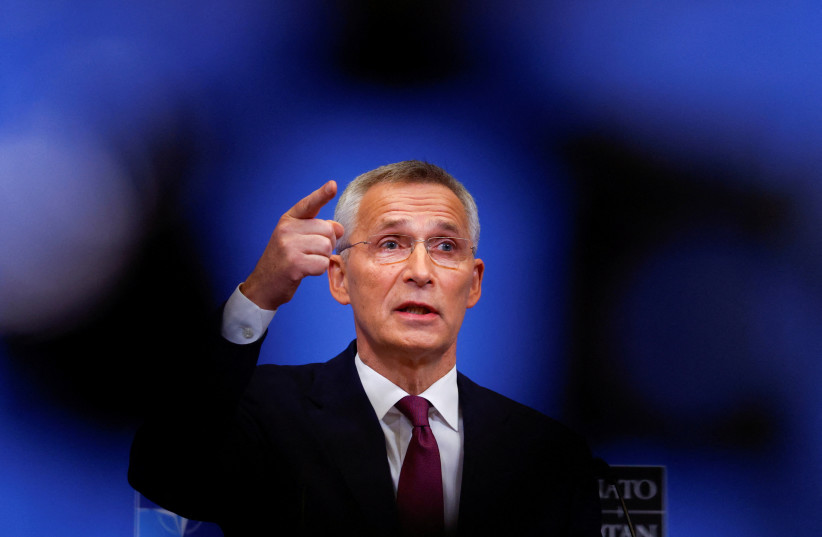President Tayyip Erdogan said on Friday it was not possible for NATO-member Turkey to support plans by Sweden and Finland to join the pact, saying the Nordic countries were "home to many terrorist organizations."
Finland's plan to apply for NATO membership, announced Thursday, and the expectation that Sweden will follow, would bring about the expansion of the Western military alliance that Russian President Vladimir Putin aimed to prevent by launching the Ukraine invasion.
"We are following the developments regarding Sweden and Finland, but we don't hold positive views," Erdogan told reporters in Istanbul, adding it was a mistake for NATO to accept Greece as a member in the past.
Turkey has been officially supportive of enlargement since it joined NATO 70 years ago. Any decision on enlargement must be made by unanimous agreement of its members.
"As Turkey, we don't want to repeat similar mistakes. Furthermore, Scandinavian countries are guesthouses for terrorist organizations," Erdogan said.
"They are even members of the parliament in some countries. It is not possible for us to be in favor," he added.
Swedish Foreign Ministry could not immediately comment on Erdogan's statement.
NATO states that membership is open to any "European state in a position to further the principles of this Treaty and to contribute to the security of the North Atlantic area."
Russia vows response as Finland seeks NATO membership without delay
Finland said on Thursday it would apply to join NATO "without delay," with Sweden expected to follow, as Russia's invasion of Ukraine looked set to bring about the very expansion of the Western military alliance that Vladimir Putin aimed to prevent.
The decision by the two Nordic countries to abandon the neutrality they maintained throughout the Cold War would be one of the biggest shifts in European security in decades. Finland's announcement angered the Kremlin, which called it a direct threat to Russia and threatened an unspecified response.
It came even as Russia's war in Ukraine was suffering another big setback, with Ukrainian forces driving Russian troops out of the region around the second largest city Kharkiv, the fastest Ukrainian advance since forcing Russia to withdraw from the capital and northeast more than a month ago.
NATO Secretary-General Jens Stoltenberg said the Finns would be "warmly welcomed" and promised an accession process that would be "smooth and swift."
Finland and Sweden are the two biggest EU countries yet to join NATO. Finland's 1,300-km (800-mile) border will more than double the length of the frontier between the US-led alliance and Russia, putting NATO guards a few hours' drive from the northern outskirts of St Petersburg.

"Finland must apply for NATO membership without delay," President Sauli Niinisto and Prime Minister Sanna Marin said in a joint statement. "We hope that the national steps still needed to make this decision will be taken rapidly within the next few days."
Asked whether Finland's accession posed a direct threat to Russia, Kremlin spokesman Dmitry Peskov said: "Definitely. NATO expansion does not make our continent more stable and secure.
"This cannot fail to arouse our regret, and is a reason for corresponding symmetrical responses on our side," Peskov added, without elaborating. Russian officials have spoken in the past about potential measures including stationing nuclear-armed missiles on the Baltic Sea.
German Chancellor Olaf Scholz welcomed on Thursday Finland's decision to apply to join the NATO military alliance, saying in a tweet it had Germany's backing.
"In a telephone conversation with the President.. I have assured Finland of the full support of the German government," tweeted Scholz.
French President Emmanuel Macron on Thursday told his Finnish counterpart that France fully supported the country's choice to join NATO, the Elysee presidential office said in a statement.
Finland must apply to join the NATO military alliance "without delay", its president and prime minister said on Thursday, in a historic policy shift triggered by Russia's invasion of Ukraine.
US President Joe Biden in a call with the leaders of Sweden and Finland on Friday said he supported NATO's open door policy and the two Nordic countries' right to determine their "own future, foreign policy, and security arrangements."
Biden spoke with Swedish Prime Minister Magdalena Andersson and Finland President Sauli Niinistö, with the three leaders reiterating their support of Ukraine, the White House said in a statement.
'LOOK AT THE MIRROR'
Asked on Wednesday if Finland would provoke Russia by joining NATO, Niinisto said: "My response would be that you caused this. Look at the mirror."
Five diplomats and officials told Reuters that NATO allies expect both countries to be granted membership quickly, paving the way for an increased troop presence in the Nordic region to defend them during a one-year ratification period.
Putin, Russia's president, cited NATO's potential expansion as one of the main reasons he launched a "special military operation" in Ukraine in February. Ukraine has long sought to join NATO, although it has lately offered at peace talks to accept some form of neutral status.
NATO describes itself as a defensive alliance, built around a treaty declaring that an attack on one member is an attack on all, effectively granting US allies the protection of Washington's superpower might, including its nuclear arsenal.
Moscow regards that as a threat to its own security and influence in neighboring countries. But Putin's decision to invade Ukraine has caused a shift in public opinion in the Nordic region, with political parties that had backed neutrality for generations now embracing the view that Russia is a menace.
Finland in particular has centuries of uneasy history in Russia's shadow. Ruled by the Russian empire from 1809-1917, it fought off Soviet invasions on the eve of World War Two, and accepted some Soviet influence as the price of avoiding taking sides in the Cold War. Since it and Sweden joined the EU in 1995, they have aligned more firmly with the West.
